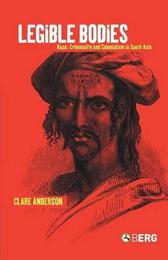
|
Legible Bodies: Race, Criminality and Colonialism in South Asia
Paperback / softback
Main Details
| Title |
Legible Bodies: Race, Criminality and Colonialism in South Asia
|
| Authors and Contributors |
By (author) Clare Anderson
|
| Physical Properties |
| Format:Paperback / softback | | Pages:288 | | Dimensions(mm): Height 216,Width 138 |
|
| ISBN/Barcode |
9781859738603
|
| Classifications | Dewey:364.954 |
|---|
| Audience | | Tertiary Education (US: College) | | Professional & Vocational | |
|---|
|
Publishing Details |
| Publisher |
Bloomsbury Publishing PLC
|
| Imprint |
Berg Publishers
|
| Publication Date |
1 May 2004 |
| Publication Country |
United Kingdom
|
Description
From the late eighteenth to mid-twentieth centuries, the British incarcerated tens of thousands of prisoners in South Asian jails and transported tens of thousands of convicts to penal settlements overseas in South East Asia, the Indian Ocean and the Andaman Islands. Legible Bodies explores the treatment of these 'native criminals' and sheds light on a largely overlooked practice of empire. British penal administrators created a series of elaborate mechanisms to render 'criminal bodies' legible. They introduced visual tags to identify prisoners and convicts, seeking to mark and/or read them both as individuals and as members of broader penal categories. The first broad theme of the book discusses the introduction of these new modes of identification - penal and decorative tattooing, clothing, photography, anthropometry and fingerprinting - exploring their frequent failures and prisoner and convict resistance against them. The second theme of the book considers the ways in which the colonial authorities atempted to use the Indian body to construct broader social groupings, both in relation to penal hierarchies and in the making of soiological categories of 'criminal types'. Thirdly, the author looks at the ways in which incarcerated communities comprised a convenient sample for colonial explorations of the nature and significance of race and caste in the Indian subcontinent. Scientists and ethnographers used prisoners to explore biological and social manifestations of the Indian 'other'. Through a careful reading of convicts' 'legible bodies', the author provides a new perspective on colonial history.
Author Biography
Clare Anderson is Senior Lecturer at the School of Historical Studies, University of Leicester.
Reviews'Legible Bodies is a wonderfully clear and well-researched study of colonial state's quest for guaranteed ways of identifying South Asian bodies within the overlapping parameters of race and criminality.' Sandhya Shetty, University of New Hampshire 'This book presents an extraordinary body of material, both in terms of past colonial practices and the depth of documentation the author has achieved. The book is theoretically informed and lucidly written and of interest to all those interested in a detailed account of one set of colonial practices, of which there are surprisingly few.' Chris Gosden, Pitt Rivers Museum 'By virtue of its subject matter, the wide range of historical and anthropological issues it touches upon, and the clarity of its writing, Legible Bodies is a book that should be widely read.' David Arnold, English Historical Review '[Legible Bodies] is well-written[...] well-researched[...] and a more than useful addition to the historiography of punishment.' Satadru Sen, Washington University 'Legible Bodies is an important contribution not only to Indian colonial history but also to general fields such as the social history of the body, anthropology, and criminology.' International Journal of Asian Studies, Vol. 5/1, 2008 'Anderson's command of cultural studies equips her to analyze penal semiotics. In this respect her study stands out ... from the persistant tendancy for criminal historiography to stick closely to the methods of social, political and economic history.' Radical History Review 'Clare Anderson's Legible Bodies offers a richly detailed and well-written contribution to the interdisciplinary scholarship on the complex nexus between colonial knowledge and colonial power (...) Anderson's book skilfully builds on the existing literature on culture and colonialism by foregrounding the physical body as a site of colonial control.' Elizabeth Kolsky, Villanova University, for the Journal of Colonialism and Colonial Culture
|